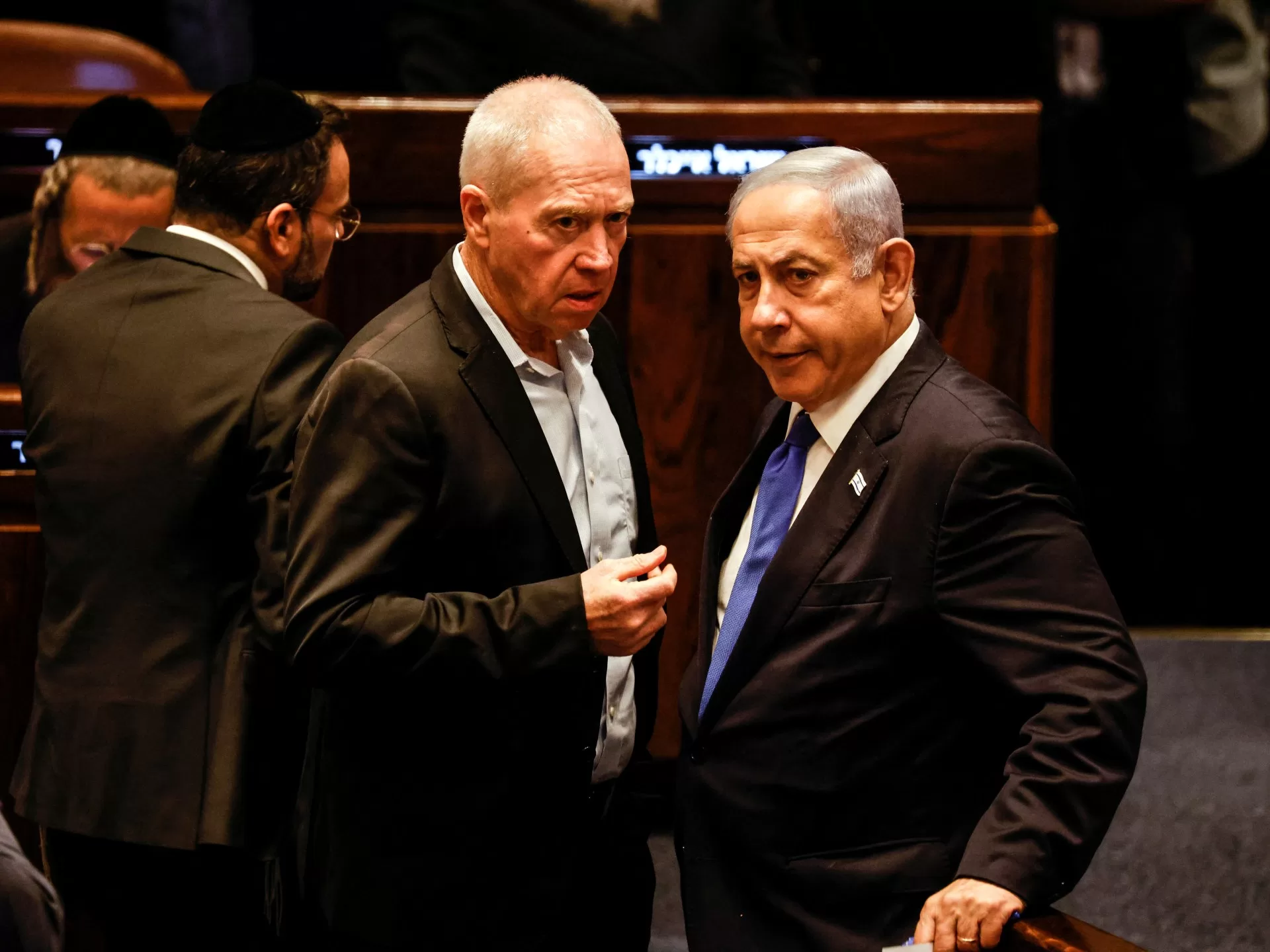As Americans cast their votes in a monumental presidential election, Israeli Prime Minister Benjamin Netanyahu quietly ousted Defence Minister Yoav Gallant.
The two figures shared an openly divisive relationship following the Hamas-led attack on southern Israel on October 7, 2023.
Netanyahu has long attempted to absolve himself of responsibility for the security lapse.
The prime minister has consistently blamed the security establishment for the events that unfolded on October 7, during which 1,139 people were killed and 250 were taken captive.
His position has compounded tensions between his far-right coalition and the Israeli army’s senior brass.
Where did Gallant stand on Gaza?
Gallant, infamous for likening Palestinians to “human animals”, has criticised Netanyahu’s war on Gaza, which has reduced most of the enclave to rubble, killed more than 43,400 people and displaced almost the entire population.
The International Criminal Court (ICC) has applied for arrest warrants against Gallant and Netanyahu, accusing them of committing atrocities such as starving Palestinians in Gaza and overseeing the extermination of civilians.
While Gallant has shown no remorse for Palestinians, he believes Israel is “conducting a war without a compass” and that it needs to reassess its military objectives in the region.
Netanyahu has responded by replacing Gallant with Israel Katz, his foreign minister and loyal ally with little military experience.
What’s behind the tumultuous history between Gallant and Netanyahu? Here’s what you should know.
What was their relationship like before Israel’s wars began?
Gallant and Netanyahu’s relationship was fractious before October 7.
In March 2023, Netanyahu was facing mass protests due to his plans to weaken the judiciary.
At the time, Gallant criticised Netanyahu during a televised address, arguing that the proposed judicial reforms endangered national security by deepening political divisions within security branches.
Critics and analysts said the judicial reforms would effectively curb the powers of the Supreme Court and embolden the legislative and executive branches of government.
They accused Netanyahu, who was facing corruption charges and implicated in a bribery scandal, of pushing through these reforms to evade criminal prosecution.
What’s the wartime division about?
In July, Gallant called for the establishment of an independent inquiry to investigate the Hamas-led attack on October 7 and security failures that day.
He said his role, the failures of the Israeli army, those of Netanyahu, as well as the culpability of the internal security agency Shin Bet should be probed.
But Netanyahu had long obstructed calls for an international or state-led inquiry, arguing that a commission should be established only after the war in Gaza, so that soldiers do not have to “hire lawyers” while fighting on the battlefield.
Critics have said Netanyahu is opposed to establishing a commission because it would reveal his role in strengthening Hamas at the expense of the Palestinian Authority (PA), which controls large swathes of the West Bank as part of the Oslo Accords – a failed peace agreement inked between Palestinian and Israeli leaders in 1993.
“We need an investigation at the national level that will clarify the facts – a state commission of inquiry,” Gallant said on a podium during a graduation ceremony for new army officers.
“It must examine all of us: the decision-makers and professionals, the government, the army and security services, this government – and the governments over the last decade that led to the events of October 7,” he added as the crowd applauded.
Did the pair agree on a strategy to return the captives?
One of the largest disputes between Gallant and Netanyahu was over securing a permanent ceasefire deal in Gaza in order to retrieve the remaining captives held by Hamas.
Netanyahu approved a temporary ceasefire deal back in November 2023, which led to the release of 105 Israeli captives in exchange for 240 Palestinian prisoners.
But since then, Netanyahu has effectively torpedoed every single ceasefire proposal in order to prolong the war in Gaza and his political career, analysts and critics have previously told Al Jazeera.
On July 31, Hamas’s political chief and lead negotiator Ismail Haniyeh was assassinated.
Haniyeh was killed while attending the inauguration of Iranian President Masoud Pezeshkian in the capital Tehran.
While Gallant did not denounce the assassination, which has been blamed on Israel, he has repeatedly called for a deal to retrieve the Israeli captives.
Israeli families of the captives believe that Gallant’s dismissal is further proof that Netanyahu is undermining a ceasefire deal.
How did Gallant envision Gaza after an end to the war?
As part of any ceasefire deal, Gallant stressed that Israel should promote or encourage a new Palestinian faction to control Gaza in a “day after” scenario.
The United States has long called on a reformed PA, headed by Mahmoud Abbas, to return to Gaza and assume governance. The PA was first pushed out of Gaza following an inter-factional war with Hamas in 2007.
Despite objections from the US and from his own security officials, Netanyahu has said that Israel will remain in full military control of Gaza and the West Bank.
In May, Gallant publicly condemned Netanyahu’s plan and said that he would “not agree to the establishment of Israeli military rule in Gaza”.
Netanyahu has dismissed Gallant’s remarks and repeatedly promised to achieve “total victory” against Hamas in Gaza.
In August, Gallant described this war aim and rhetoric as “nonsense”.
